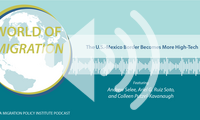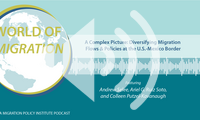
Andrew Selee
President
Andrew Selee is President of the Migration Policy Institute (MPI), a global nonpartisan institution that seeks to improve immigration and integration policies through fact-based research, opportunities for learning and dialogue, and the development of new ideas to address complex policy questions, a position he assumed in 2017. He also chairs MPI Europe's Administrative Council.
|
Media Requests |
Dr. Selee’s research focuses on migration globally, with a special emphasis on immigration policies in the United States, Latin America, and the Caribbean. He is the author of several books, including, most recently, Vanishing Frontiers: The Forces Driving Mexico and the United States Together (PublicAffairs, 2018) and What Should Think Tanks Do? A Strategic Guide to Policy Impact (Stanford University Press, 2013).
He has published opinion articles in Foreign Affairs, Foreign Policy, and Americas Quarterly, and he contributes a regular column to Mexico’s largest newspaper, El Universal. He is an adjunct professor at Georgetown University, teaching courses on global migration, and has previously taught at Johns Hopkins and George Washington universities and been a visiting scholar at El Colegio de México.
Dr. Selee was a Co-Director of the Regional Migration Study Group, convened by MPI with the Wilson Center, and part of the steering committee for MPI’s Independent Task Force on Immigration and America’s Future. In the late 1990s and early 2000s, he served on the Board of Directors of the YMCA of the USA, the nation’s largest membership organization.
Prior to joining MPI, he spent 17 years at the Woodrow Wilson Center, where he founded the Center’s Mexico Institute and later served as the Center’s Vice President for Programs and Executive Vice President. He has also worked as staff in the U.S. Congress and on programs with migrant youth in Tijuana, Mexico.
He holds a PhD in policy studies from the University of Maryland; an MA in Latin American studies from the University of California, San Diego; a BA, Phi Beta Kappa, from Washington University in St. Louis; and a certificate in strategic perspectives on nonprofit management from Harvard Business School. He was selected as an Andrew Carnegie Fellow for the 2017-18 period.
Bio Page Tabs
MPI President Andrew Selee and two colleagues who joined him at the U.S.-Mexico border to examine increasingly sophisticated U.S. Customs and Border Protection operations discuss the evolution of policies and procedures to address asylum seekers and other migrants arriving at official ports of entry.
How are U.S. border operations and policies evolving at the U.S.-Mexico border to address rising and diversifying flows? And what is driving increasing immigration from across Latin America, the Caribbean, and beyond? MPI President Andrew Selee speaks with two colleagues who traveled from one end of the nearly 2,000-mile boundary to the other, touring U.S. Customs and Border Protection facilities and interviewing U.S. and Mexican officials, NGO leaders, and others.
Marking the launch of MPI’s Global Skills and Talent Initiative, this webcast features senior policymakers and other experts discussing the extent to which labor market needs should shape future immigration policy decisions, and how countries are adjusting—and could adjust—their immigration systems to meet human capital and competitiveness needs.
This expert conversation reviews migration in nine Caribbean countries, outlining challenges and opportunities for the integration of the migrant population and a successful engagement with diasporas to advance development, along with recommendations to strengthen the region’s capacity to accommodate changing patterns of migration.
En este webinar, expertos del Banco Interamericano (BID) y el Migration Policy Institute (MPI) presentaron las principales conclusiones de su nueva publicación sobre la realidad migratoria de la región y compartieron algunos de los desafíos y oportunidades para la integración de la población migrante y para capitalizar el potencial de sus diásporas como un impulso para el desarrollo.
Pages
Recent Activity
Los países de América Latina y el Caribe han aprovechado, de manera pragmática, una variedad de herramientas políticas para otorgar estatus legal a al menos la mitad de los más de 6 millones de venezolanos desplazados en la región. Este informe explora hasta qué punto los venezolanos desplazados han podido obtener un estatus legal en los 15 principales países receptores, su acceso al mercado laboral y a servicios públicos, y dónde persisten brechas.
















As Europe and the United States Face Similar Migration Challenges, Spain Can Act as a Bridge
Regional Processing Centers: Can This Key Component of the Post-Title 42 U.S. Strategy Work?
The Los Angeles Declaration Could Represent a Big Step for Real Migration Cooperation across the Americas
La Declaración de Los Ángeles podría representar un gran paso para la cooperación migratoria real en las Américas
The Ukrainian Conflict Could Be a Tipping Point for Refugee Protection
Beyond the Border: Opportunities for Managing Regional Migration between Central and North America
Strategic Solutions for the United States and Mexico to Manage the Migration Crisis
Soluciones estratégicas para afrontar la crisis migratoria en Estados Unidos y México